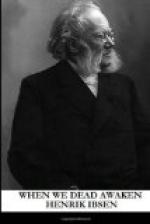PROFESSOR RUBEK.
[Bows his head.] And laying my life waste.
IRENE.
[Suddenly firing up.] It was just that I wanted! Never, never should you create anything again—after you had created that only child of ours.
PROFESSOR RUBEK.
Was it jealously that moved you, then?
IRENE.
[Coldly.] I think it was rather hatred.
PROFESSOR RUBEK.
Hatred? Hatred for me?
IRENE.
[Again vehemently.] Yes, for you—for the artist who had so lightly and carelessly taken a warm-blooded body, a young human life, and worn the soul out of it—because you needed it for a work of art.
PROFESSOR RUBEK.
And you can say that—you who threw yourself into my work with such saint-like passion and such ardent joy?—that work for which we two met together every morning, as for an act of worship.
IRENE.
[Coldly, as before.] I will tell you one thing, Arnold.
PROFESSOR RUBEK.
Well?
IRENE.
I never loved your art, before I met you.—Nor after either.
PROFESSOR RUBEK.
But the artist, Irene?
IRENE.
The artist I hate.
PROFESSOR RUBEK.
The artist in me too?
IRENE.
In you most of all. When I unclothed myself and stood for you, then I hated you, Arnold—–
PROFESSOR RUBEK.
[Warmly.] That you did not, Irene! That is not true!
IRENE.
I hated you, because you could stand there so unmoved—–
PROFESSOR RUBEK.
[Laughs.] Unmoved? Do you think so?
IRENE.
—at any rate so intolerably self-controlled. And because you were an artist and an artist only—not a man! [Changing to a tone full of warmth and feeling.] But that statue in the wet, living clay, that I loved—as it rose up, a vital human creature, out of those raw, shapeless masses—for that was our creation, our child. Mine and yours.




